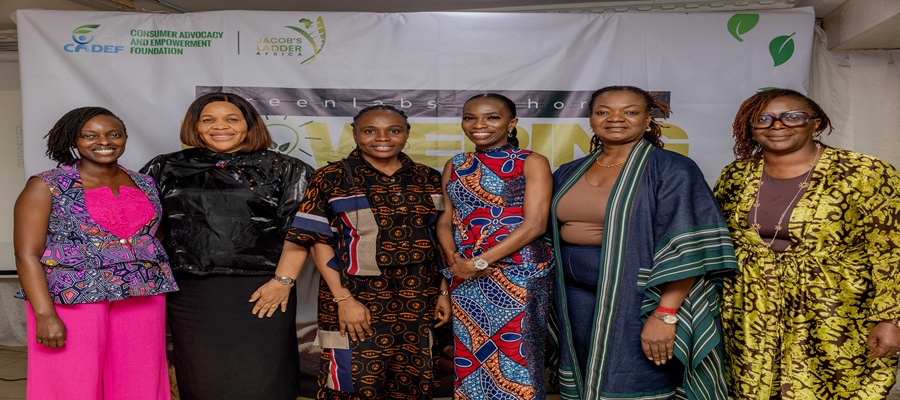News
Panic as Rumour Links GSM to Earthquake

Some mobile phone users switched off their phones last week after rumours broke out that cosmic rays entering the earth could cause earthquake in the country, Nigeria CommunicationsWeek can now reveal
Panic-stricken Nigerians who waited for assurances from authorities, but got little information resorted to conjectures.
It was reminiscent of the July, 2004 rumour that it was possible for a GSM phone to kill people.
On Friday however, industry experts and Nigerian Communications Commission (NCC), the apex regulator who spoke with Nigeria CommunicationsWeek, dismissed the rumour and were unanimous that it lacked “scientific evidence”
But the rumour succeeded in raising awareness to the looming disaster posed by the imminent volcanic eruption from Lake Nyos in the Republic of Cameroun and the danger it poses to some parts of Benue, Taraba, Adamawa and Cross River States.
It began like a joke on Wednesday last week when the text message quoting Nasa, United States space agency and BBC read “Cosmic rays entering earth from Mars. So switch off your mobiles from 4pm today to 6am tomorrow by NASA/BBC News, please tell others”.
This reporter received the first copy of the message on Wednesday, January 20 at 3.20pm and by Friday, the rumour assumed another life spreading fears and panic. Some Nigerians took it serious and also spread it by word of mouth.
Nigeria CommunicationsWeek gathered that an impending earthquake was associated with the cosmic rays, energetic particles originating from outer space that impinge on Earth’s atmosphere. The recent devastating earthquake in Haiti only helped to fuel the rumour mill.
Some said that comic rays were attacks from the evil spirits while others claimed it was a way to control traffic on some networks. Elsewhere, another group said it could be a de-marketing strategy after claims that the cosmic rays affect only a particular network.
Nigeria CommunicationsWeek recalled that in 2004, stories claiming people have died after they received phone calls from certain numbers owned by the local GSM operator broke out.
Experts said that stories are baseless and had no scientific evidence and urged Nigerians to ignore the stories.
Reuben Mouka, head of media and public relations, NCC, said there is no scientific evidence to support the stories and urged mobile users to continue using their devices.
Dr. Emmanuel Ekuwem, president, Association of Telecommunications Companies of Nigeria (Atcon), nodded in agreement.
As they spoke attention, concerns are mounting although; no active earthquakes have been established in Nigeria.
But a review of seismicity record in Nigeria by Dr. Adepelumi A. A of department of Geology, Obafemi Awolowo University, had showed that Nigeria may not be aseismic as has hitherto been believed.
He pointed at recent events in Nigeria: Ijebu-Ode (July and August, 1984); Gulf of Guinea (December, 1984). Warri (1933), Lagos (1939); Umuahia (July, 1961); Kundunnu, Bauchi (1981); Dambatta, Kano (July, 1975); Yola (December, 1984) and Gombe (June, 1985).
Adepelumi therefore urged that monitoring and prediction of earthquake hazards should begin by a proper documentation of the pathways through which they emanate, using seismological data.
News
NITDA Explores Partnership with Trust Stamp on Digital Trust and Innovation

By Naeemah Junaid
The National Information Technology Development Agency (NITDA) has held strategic discussions with representatives of Trust Stamp, a NASDAQ-listed global technology company, to explore potential areas of partnership aimed at strengthening Nigeria’s digital trust framework and advancing innovation within the digital economy.

The meeting, chaired by NITDA Director General, Kashifu Inuwa Abdullahi, focused on identifying collaborative opportunities aligned with Nigeria’s digital transformation agenda and the Agency’s strategic priorities for building a secure, inclusive, and innovation-driven digital ecosystem.
Inuwa emphasised that trust remains a critical foundation for the growth of the digital economy, noting that secure systems and strong cybersecurity frameworks are essential for driving innovation, economic growth, and national development. He stated that building trust in digital platforms and services is key to accelerating adoption and unlocking opportunities across sectors.
He reiterated NITDA’s mandate as a regulator to create an enabling environment through forward-looking policies and regulatory frameworks that support innovation rather than promote specific technologies. According to him, government interventions are designed to stimulate markets, create opportunities, and empower both businesses and citizens to participate fully in the digital economy.
The Director General further reaffirmed Nigeria’s openness to investments that strengthen digital infrastructure and enhance digital services, stressing that sustainable national development is best driven by private sector participation under supportive regulatory and policy frameworks. He called for continued engagement to ensure alignment with national priorities and effective integration into Nigeria’s digital ecosystem.
In his remarks, Trust Stamp Vice President, Jonathan Pasha, highlighted the company’s global experience in secure verification and trust technologies, describing its approach as partnership-oriented and focused on delivering long-term value within local ecosystems. He noted that the company prioritises collaboration with governments and private sector stakeholders to address local challenges and expand access to secure digital services.
Pasha referenced Trust Stamp’s ongoing operations in Nigeria, including its collaboration with a telecommunications provider to enhance SIM swap prevention and fraud detection capabilities. He also outlined the firm’s biometric tokenisation technology, which converts biometric data into secure, privacy-preserving representations, enabling verification processes without exposing sensitive information.
He explained that the technology supports secure verification, fraud prevention, financial inclusion initiatives, and the tokenisation of real-world assets, while being designed to function effectively in low-connectivity environments and on low-specification devices to expand access to digital services.
Both parties expressed interest in advancing technical-level discussions to identify specific areas of collaboration aligned with national priorities and Nigeria’s digital transformation objectives.
NITDA reaffirmed its commitment to fostering a secure and trusted digital economy through strategic partnerships, robust regulatory frameworks, and initiatives that promote innovation, inclusion, and sustainable growth.
News
Geocycle, Ecobag Mart, Leovia Farms emerge winners at Greenlabs Demo Day

Three youth-led startups — Geocycle, Ecobag Mart and Leovia Farms — have emerged top winners at the Greenlabs Cohort 2 “Powering Food Systems” Demo Day, securing pre-seed funding to scale solutions targeting Nigeria’s food insecurity, post-harvest losses and climate pressures.

CADEF
The Demo Day, hosted under the Greenlabs Incubation Programme powered by the Consumer Advocacy and Empowerment Foundation (CADEF) in partnership with Jacobs Ladder Africa (JLA), spotlighted 16 innovators selected through a nationwide call and intensive mentor-guided screening process.
Organisers said the winning solutions stood out for their scalability, environmental sustainability and potential to strengthen fragile agricultural value chains. The pre-seed support will fund prototype refinement, business registration, market validation and early commercial deployment.
Other finalists showcased at the event included Agricool and Dry Heat Solutions, with all participants advancing into a structured nine-month incubation programme focused on enterprise development, expert mentorship and access to growth resources aimed at transforming early-stage ideas into viable green businesses.
Delivering the keynote on behalf of the Permanent Secretary, Ministry of Agriculture and Food Systems, Emmanuel Audu Fatai described the emergence of the winners as proof that youth innovation is becoming central to Africa’s food future.
According to him, the continent’s vast agricultural potential continues to coexist with food shortages, climate stress and weak value chains, making technology-driven and energy-efficient solutions critical to achieving sustainable food security.
Executive Director of CADEF, Prof. Chiso Ndukwe-Okafor, said the selection of the three winners reflects the programme’s shift from ideas to impact-driven enterprises capable of creating jobs and delivering measurable community value.
She added that beyond funding, the incubation framework is designed to instil financial discipline, integrity and long-term business sustainability among participating founders.
Chief Innovation Officer at Jacobs Ladder Africa, Karen Chelang’at, noted that the winning solutions directly address real food-system failures through renewable-energy integration, loss reduction and productivity improvement across sectors such as poultry, aquaculture and agricultural logistics.
She emphasised that the ultimate measure of success will be the ability of the startups to achieve market readiness, scale operations and generate tangible economic and environmental impact.
Organisers stressed that while policy support remains important, cross-sector collaboration and youth-driven enterprise will play a decisive role in building resilient food systems and advancing Nigeria’s transition to a green economy.
With incubation now underway and funding secured, the emergence of Geocycle, Ecobag Mart and Leovia Farms marks a significant step toward translating youth innovation into practical solutions for Nigeria’s food and climate challenges.
News
NDIC Moves to Boost Customers’ Confidence in Nigerian Banks

The Nigeria Deposit Insurance Corporation (NDIC) has reaffirmed its commitment to safeguarding the nation’s financial system, announcing that its recent upward review of the maximum deposit insurance coverage now protects about 99% of depositors in the Country.

Kabir Katata, Executive Director (Operations), NDIC, stated this on Wednesday at the Corporation’s 2025 Stakeholders’ Town Hall Meeting held in Enugu.
Katata, while speaking on the theme, “Deepening Stakeholder Engagement,” said the policy to expand deposit insurance coverage was deliberately designed to protect small savers, promote financial inclusion and strengthen public confidence in the banking sector.
He explained that the town hall meeting was aimed at engaging stakeholders across various sectors, including academia, market associations and civil society groups.
“The essence of this town hall meeting is to interact with our stakeholders, tell them what we do and listen to their questions so they can better understand the role NDIC plays in society. We guarantee depositors’ funds and supervise banks to ensure that depositors are protected”, he said.
Katata noted that following the 2024 review of deposit insurance coverage, depositors in Deposit Money Banks (DMBs), Mobile Money Operators (MMOs) and Non-Interest Banks (NIBs) are now insured up to N5 million per depositor.
Similarly, depositors in Microfinance Banks (MFBs), Primary Mortgage Banks (PMBs) and Payment Service Banks (PSBs) now enjoy insurance coverage of up to N2 million per depositor.
“This means that in the event of a bank failure, depositors are promptly paid up to the insured limit,” he said.
He added that depositors with balances exceeding the insured limit would receive the initial insured sum, while the outstanding balance would be paid as liquidation dividends upon realisation of the failed bank’s assets and recovery of debts.
Highlighting improvements in the payout process, Katata referenced the recent resolution of defunct institutions, including Heritage Bank Limited, Union Homes PLC and Aso Savings and Loans PLC.
He said that the Corporation successfully leveraged the Bank Verification Number (BVN) as a unique identifier to trace depositors’ alternative accounts and transfer insured sums within days of bank closures.
“I urge all depositors to ensure that their BVN is properly linked to their bank accounts and identity records. This greatly facilitates seamless and timely access to insured deposits in the event of bank failure,” he advised.
Katata emphasised that although the NDIC works closely with the Central Bank of Nigeria (CBN) to ensure sound corporate governance and regulatory compliance in banks, financial system stability remains a shared responsibility.
“While the CBN and NDIC continue to strengthen oversight, depositors also have a responsibility to remain vigilant and well-informed,” he said.

 E-Financial2 days ago
E-Financial2 days agoBillions in Nigeria’s Reserves, But Where is the Growth?

 Telecom2 days ago
Telecom2 days agoQNET unveils ‘Energize Everyday’ theme, intensifies consumer protection, media partnership in 2026

 E-Financial2 days ago
E-Financial2 days agoAdedeji, NRS Boss says Technology is Crucial to Tax Reform’s Success

 E-Business2 days ago
E-Business2 days agoKaspersky Reports 15% Growth in Malicious email Attacks in 2025

 News2 days ago
News2 days agoNDIC Moves to Boost Customers’ Confidence in Nigerian Banks

 General News2 days ago
General News2 days agoRussia Blocks WhatsApp, Pushes State App Max as Alternative Amid Telegram Clampdown

 General News2 days ago
General News2 days agoIdenty.io Targets Nigeria, Kenya in Its Africa Expansion Strategy

 News1 day ago
News1 day agoNITDA Explores Partnership with Trust Stamp on Digital Trust and Innovation













